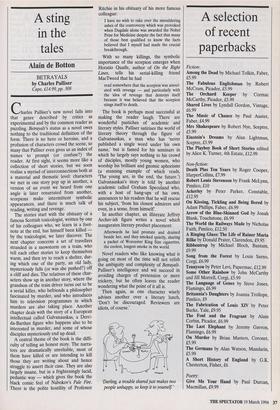A sting in the tales
Main de Botton
BETRAYALS by Charles Palliser Cape, £14.99, pp. 308 Charles Palliser's new novel falls into that genre described by critics as experimental and by the common reader as puzzling. Betrayals's status as a novel owes nothing to the traditional definition of the form. There is no hero or heroine, and a profusion of characters crowd the scene, so many that Palliser even gives us an index of names to prompt (or confuse?) the reader. At first sight, it seems more like a collection of short stories, but we soon realise a myriad of interconnections both at a material and thematic level: characters we met in one story pop up in another, a version of an event we heard from one angle is later renarrated from another, scorpions make intermittent symbolic appearances, and there is much talk of reading, writing and revenge.
The stories start with the obituary of a famous Scottish toxicologist, written by one of his colleagues who, we learn in a foot- note at the end, has himself been killed by the toxicologist, we later discover. The next chapter concerns a set of travellers stranded in a snowstorm on a train, who tell each other stories to keep themselves warm, and then try to reach a shelter, dur- ing which one of the party, an old lady, mysteriously falls (or was she pushed?) off a cliff and dies. The relatives of these char- acters show up in another story, where the grandson of the train driver turns out to be a serial killer, who befriends a philosopher fascinated by murder, and who introduces him to television programmes in which murders are also taking place. Another chapter deals with the story of a European intellectual called Galvanauskas, a Derri- da-Barthes figure who happens also to be interested in murder, and some of whose disciples mysteriously end up dead. A central theme of the book is the diffi- culty of telling an honest story. The narra- tors are dramatically unreliable, most of them have killed or are intending to kill those they are writing about and hence struggle to assert their case. They are also largely insane, but in a frighteningly lucid, pedantic way — which gives the book the black comic feel of Nabokov's Pale Fire. There is the polite hostility of Professor Ritchie in his obituary of his more famous colleague:
I have no wish to rake over the smouldering ashes of the controversy which was provoked when Dugdale alone was awarded the Nobel Prize for Medicine despite the fact that many of those best qualified to know the facts believed that I myself had made the crucial breakthrough.
With so many killings, the symbolic importance of the scorpion emerges when Horatio Quaife, author of On the Right Lines, tells his serial-killing friend MacTweed that he had
read somewhere that the scorpion was associ- ated with revenge — and particularly with the idea of revenge that destroys itself because it was believed that the scorpion stings itself to death.
The book is perhaps most successful at making the reader laugh. There are wonderful pastiches of academic and literary styles. Palliser satirises the world of literary theory through the figure of Galvanauskas, a man who has 'never published a single word under his own name,' but is famed for his seminars in which he largely says nothing to his crowd of disciples, mostly young women, who worship his brilliant and gnomic aphorisms (a stunning example of which reads, `The young are, in the end, the future.') Galvanauskas's story is told by another academic called Graham Speculand who, with a host of hang-ups of his own, announces to his readers that he will rescue his subject, 'from his closest admirers and even, in a sense, from himself.
In another chapter, an illiterate Jeffrey Archer-ish figure writes a novel which inaugurates literary product placement:
Afterwards he laid prostate and drained beside her, and they smoked quietly, sharing a packet of Worcester King Size cigarettes, the coolest, longest smoke in the world.
Novel readers who like knowing what is going on most of the time will not relish the ambiguity and complexity of Betrayals. Palliser's intelligence and wit succeed in avoiding charges of pretension or mere trickery, but he often leaves the reader wondering what the point of it all is.
Then again, as one character wisely advises another over a literary lunch, `Don't be discouraged. Reviewers are idiots, of course.'
`Darling, a trouble shared just makes two people unhappy, so keep it to yourself'


























































 Previous page
Previous page